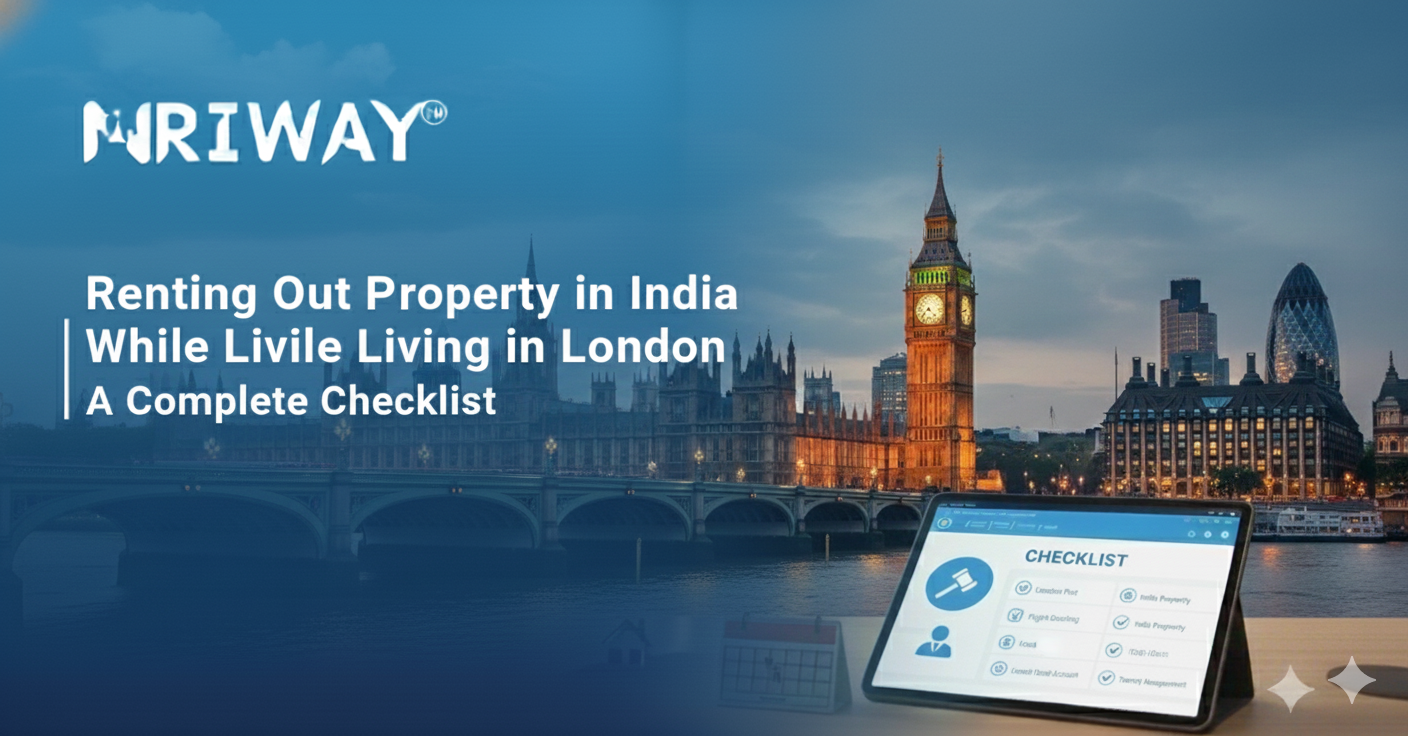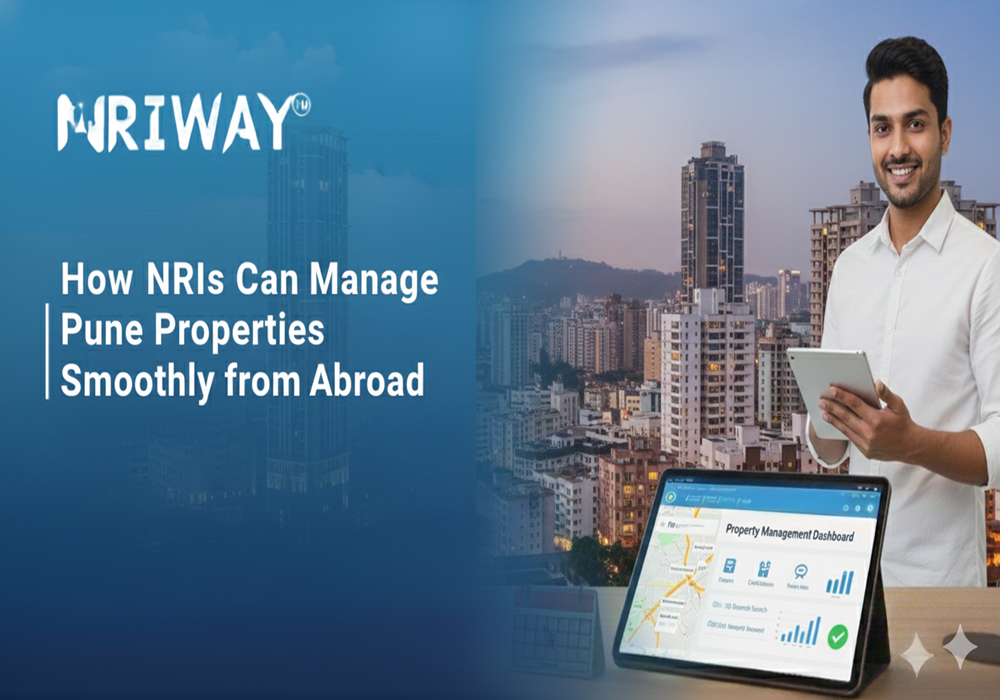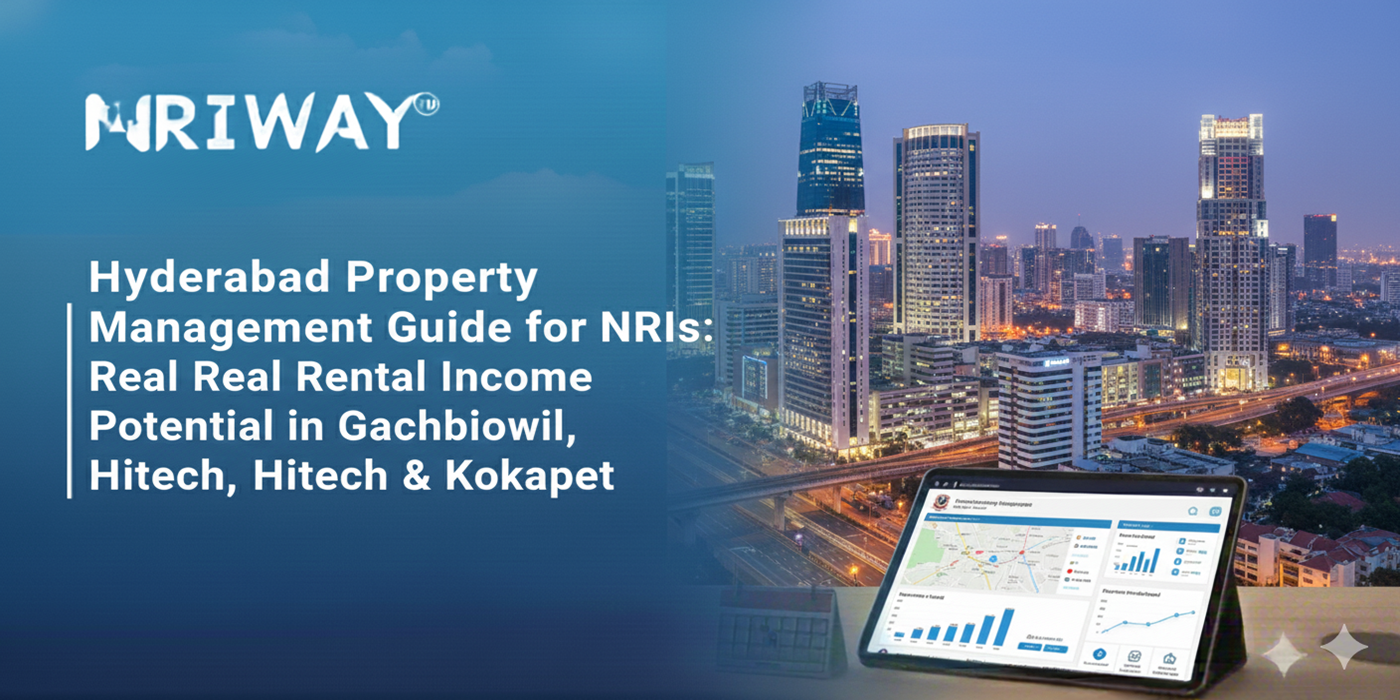Renting Out Property in India While Living in London — A Complete Checklist

Renting Out Property in India While Living in London — A Complete Checklist
If you're an NRI living in London and own property in India, renting it out can be a lucrative move but it also involves many moving parts. This blog provides a step-by-step checklist, shares statistical insight and trends, and outlines legal, financial and operational best practices so you can manage your Indian property with confidence.
Why This Matters
For many NRIs based in the UK, US or other parts of Europe, renting out property in India serves multiple purposes: generating rental income, preserving an Indian connection, and hedging currency risk. Here are some compelling stats:
- The share of NRI investment in Indian real-estate has risen from around 10% in 2019-20 to about 15% today, and is projected to hit 20% by 2025.
- Rental yields in major Indian cities for mid-segment properties are around 4%-6% annually, while luxury yields tend to be lower (2.5%-4%) because of higher price base.
- A survey found that about 24% of NRIs experience difficulties managing rental properties back home (tenant issues, rent collection, maintenance) when living abroad.
Simply put: the opportunity is real, but so are the risks and management burden.
Pre-Renting Checklist (Before You List)
1. Clear the Ownership & Title
- Ensure the property is registered in your name and all legal documents (title deed, sale deed, association dues) are clear.
- If you’re abroad permanently, consider giving a Power of Attorney (PoA) to a trusted person in India for handling documents, lease signings, etc.
- Verify the property is registered under Foreign Exchange Management Act (FEMA) rules for NRIs – for example, you must hold the property within the permitted class of assets (residential/commercial) and in a permitted manner.
2. Understand Tax & Banking Implications
- Rental income is taxable in India. As an NRI you’ll have to deduct TDS at 30 % (plus cess) unless DTAA (Double Taxation Avoidance Agreement) benefits apply.
- Open an NRO (Non-Resident Ordinary) account for receiving rental payments. According to a survey, a number of UK-based NRIs rely on NRO accounts to collect rent.
- Retain receipts and tenant information: you may need to file a tax return in India even if you’re non-resident.
- If your property is jointly held, coordinate with co-owners about rental splits, tax liability, maintenance responsibilities.
- Review the tax treatment of capital gains, especially if you may sell in future — rental decisions affect holding period, improvement costs, indexation benefits, etc.
3. Estimate the Rent & Set Expectations
- Research comparable properties in the locality for rent: size, amenities, location matter.
- Be realistic: Many luxury properties yield only ~2.5-4% per annum.
- Factor in maintenance, vacancy periods, property management fees if you outsource.
4. Choose a Reliable Local Co-Partner / Manager
- Since you're in London, appoint someone you trust (family member, lawyer, property manager) to supervise: tenant screening, rent collection, maintenance, emergencies.
- Insist on regular updates (photos, statements, leases) and have a formal agreement with your manager/agent.
- Check credentials: Are they registered with RERA? Do they have references or reviews?
5. Prepare the Property
- Complete any pending repairs, painting, fix plumbing/electrical issues. A well-maintained property attracts better tenants and reduces risk.
- Decide if you rent furnished/unfurnished: furnished often fetches higher rent but includes higher maintenance.
- Prepare a proper lease agreement (minimum 11 months typical in India) with clauses on security deposit, maintenance responsibilities, rent escalation, eviction.
- Get the property insured against damage (fire, natural disaster) if you will not be on-site.
While the Tenancy is Ongoing
6. Rent Collection & Accounting
- Prefer digital transfer to your NRO account maintain proof of payments.
- Keep track of rent receipts, banking statements, expenditure (repairs, property manager fee) useful for tax filing.
- Consider local service-contracts for recurring items (elevator maintenance, common area cleaning, water/power) to avoid last-minute surprises.
7. Communication & Oversight
- Schedule periodic video calls/walk-throughs with your local manager/tenant to monitor condition.
- Ask for high-resolution photographs, perhaps videos (when feasible) every 6-12 months.
- Maintain a log: date of tenant entry, deposit amount, rent start date, any repairs, complaints etc.
8. Rent Escalation & Renewal
- Typically Indian leases include rent escalation (e.g., 5-10% every 2–3 years) or suggest a market review at renewal.
- When you’re abroad, it’s easy to overlook renewal timelines set reminders.
- On renewal, update lease documentation and ensure tenant signs newer version (even digitally if local law permits).
9. Maintenance & Major Repairs
- Plan for major maintenance such as roof repairs, plumbing replacement, painting every 3-5 years so that the property remains rent-worthy.
- Budget a “maintenance reserve” (say 5-10% of annual rent) to cover sudden major works.
- Clarify in the lease who is responsible for what (tenant vs owner vs society/association).
10. Exit/Change of Use Planning
- If you plan to sell or use the property yourself in future, audit your lease, ensure no legal hindrance (e.g., society rules, occupancy certificate).
- If you plan to change the tenancy type (say, convert to serviced accommodation or short-stay) check municipal/local regulations, tax implications and society rules.
Legal & Compliance Essentials
- Ensure the property society or apartment association doesn’t impose restrictions on NRIs or leasing. Review by-laws.
- Keep title document, occupancy certificate (OC), completion certificate (CC) (if applicable), building plan approvals safely archived.
- Before signing a tenant lease, ensure tenant identity verification (Aadhaar or passport, PAN, references) and keep copy of ID proof.
- For NRIs, any sale of property later triggers tax implications: short-term vs long-term capital gains, indexation benefits, implications for trust/inheritance.
- If you hire a property manager or agent, use a written agreement with defined duties, reporting frequency, fees and termination clause.
Key Metrics & Trends for NRIs
- In India’s top 8 cities, average housing prices rose by about 7% in 2022, with expectations of single-digit growth in 2023.
- Rental yields for mid-segment housing: ~4-6% per annum.
- In a survey, 52% of NRIs expressed that they would prefer property-management services to manage their assets remotely.
- Remote management remains a challenge: 24% of NRIs said they experienced issues managing their property from abroad (tenant problems, rent payments, maintenance) in one survey.
Why This Approach Works
Managing your Indian rental property while living abroad effectively requires a structured, repeatable system: clarity of documentation, professional help locally, robust oversight, proactive maintenance and compliance. The aim is to make the property a stable income asset rather than a remote liability. By following this checklist you reduce surprises and maximise returns.
High-Intent Keywords to Target
(For your blog SEO benefit – these keywords align with what NRIs searching for this topic are likely to use)
- “NRI property rental India checklist”
- “renting out property in India for NRIs UK”
- “how NRIs manage rental property India while living abroad”
- “tax on rental income for NRIs in India”
- “NRI property management India best practices”
- “rental yield Indian city NRI property”
- “legal issues NRIs renting property in India”
FAQs
Q1. Can I rent out property in India even though I live in London (or abroad)?
Yes as an NRI you can own residential or commercial property in India and lease it out. Ensure you have the correct banking setup (NRO account) and you comply with tax and FEMA rules.
Q2. Do I need to file an Indian income tax return if I receive rental income?
Yes. Rental income earned in India is taxable under Indian law. Filing an income-tax return may be mandatory if your total income (including rent) exceeds the basic exemption limit.
Q3. Which bank account should I use to receive rents?
It’s advisable to open an NRO (Non-Resident Ordinary) account in India to receive rental income. From this account, you can remit surplus funds abroad subject to RBI rules.
Q4. What rental yield should I expect from my Indian property?
While yields vary by location, segmentation and condition, a reasonable expectation for mid-segment properties in major Indian cities is around 4-6% per annum. Luxury properties often yield ~2.5-4%.
Q5. How do I handle maintenance while living abroad?
Appoint a local manager or trusted person with explicit instructions and reporting. Set aside a maintenance reserve, schedule periodic inspections (virtually or via local manager), and keep a documented log of expenses and repairs.
Q6. What happens when I eventually decide to sell the property?
You’ll have to deal with capital gains tax, documentation of purchase price, cost of improvements, indexation benefit (depending on holding period), and possibly additional tax provisions for NRIs. Also ensure your title is clear and the property isn’t encumbered.
Q7. Are there any specific risks for NRIs leasing out property in India?
Yes these include tenant disputes, non-payment of rent, unapproved alterations by tenants, high vacancy periods, inadequate maintenance, legal disputes over title or society rules, and remittance restrictions. According to surveys, remote management is cited as a major challenge by many NRIs.
Final Thoughts
If you live in London and own a property in India, renting it out offers a compelling opportunity but success depends on disciplined management, professional partnerships, and adherence to legal and financial protocols. Treat it like a business: set up processes, monitor performance, and review periodically. With the right system in place, you can turn your India property into a sustainable income stream and long-term asset.
If you like, I can prepare a downloadable checklist PDF tailored for NRIs renting property in India (UK-based scenario) for you to keep as a reference. Would you like me to create that?



